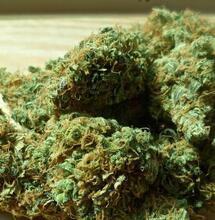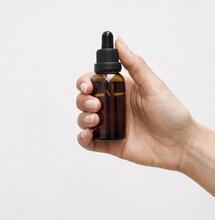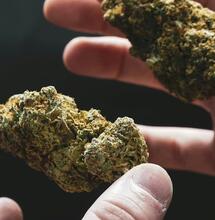Cannabis for Gout Treatment: Does It Always Work?

Cannabis can be tried and used as a medicine for gout, which is a complex type of arthritis. However, cases vary and sometimes gout treatment may require prescription pills. Combining cannabis and some prescription medicines that doctors give for gout might lead to adverse reactions. Learn more about medical cannabis for gout treatment and when cannabis patients should be careful.
Gout is a widespread and complex form of arthritis that occurs due to excess of uric acid in the body. It’s a painful inflammatory condition, marked by sudden and severe attacks of pain, swelling, soreness, and redness in one or more joints. Very often it’s the area around the big toe that becomes inflamed and affected by gout.
An attack of gout can happen quite suddenly, to a point it can wake up a person during their sleep. It can hurt so much that even the weight of the bedsheet is a source of discomfort.
Gout is not active all the time, but when the symptoms appear there are ways in which to control them. Cannabis is one of the medicines that can be used and is used in gout treatment. Aside from taking medicines and natural supplements, avoiding purine-containing foods may be equally important to help control this health condition.
How Can Cannabis Help with Gout?
Treatments for gout usually involve a combination of symptom management and adjusting your diet. The excess of uric acid is related to intolerance and overconsumption of purine-rich foods. The list of such foods include red meat, seafood, canned fish, poultry, sweetened beverages, oatmeal, alcohol and more. Those struggling with gout should adapt their diet accordingly and avoid these foods.
Apple cider vinegar, apples, bananas, celery, cherries, hibiscus, ginger, magnesium and olive oil are some of the healthy nutrition supplements that should be taken more often when dealing with gout.
As a painful, inflammatory disease, gout can be medicated with cannabis. THC, CBD and other cannabinoids can produce effects that soothe gout patients. Medical marijuana can facilitate fast pain relief; the cannabinoids can work as anti-inflammatory agents, and potentially also help regulate the extra uric acid in the body.
CBD oils and tinctures are a non-intoxicating way to treat pain and inflammation associated with gout. Those who’ve never taken CBD should start with low doses and increase gradually as needed. CBD can be taken in the form of tincture, pills, edibles, or applied on the skin as balms and topicals.
However, sometimes gout attacks can be so acute and severe, and it would be inadequate to only rely on cannabis or other natural supplements for the treatment. Doctors may prescribe additional medications.
Long-term gout patients can be prescribed pills that block uric acid production. Inhibitors include allopurinol (Aloprim, Lopurin, Zyloprim) and febuxostat (Uloric), according to Harvard Health Publishing.
However, the primary goal in gout treatment is reducing inflammation and pain. Treatment is recommended within 24 hours of gout attack and is stopped once the attacks are over and symptoms subdued.
Cannabis in Combo with Gout Medication May Cause Adverse Reactions
Doctors can prescribe various anti-inflammatories and anti-pain medicines for gout treatment. One such medicine is Colchicine, used to stop swelling and gout attacks. And this is where a problem can begin. Cannabis is not compatible with all prescription medicines, and Colchicine might be one of them.
There have been patient reports complaining of negative side effects when simultaneously taking medical cannabis and colchicine. Symptoms reported include palpitations, sweating, dizziness, tingling all over the body, altered perception, and even paranoia. While these reactions may not depict the experience of every single patient who has taken colchicine and cannabis together, there’s the possibility that it can happen in some cases.
Colchicine is extracted from autumn crocus (Colchicum autmnale), which belongs to the lily family of plants (Liliaceae). The main active ingredient colchicine is found in all parts of the plant, while its concentration is highest in the seed pods. Like cannabis, this plant too has been used in medicine for thousands of years.
Pharmacological preparations with colchicine are usually recommended in high doses for the duration of the therapy. As instructed by a physician, tablets may need to be taken every few hours for a successful gout treatment, and should be stopped when gout symptoms go away.
Of course, it’s possible that some cannabis patients would not experience any adverse reactions if they also take colchicine for treating gout. Someone may have positive experiences with this combination. However, as no studies have yet been carried out on the interaction between colchicine and cannabinoids/cannabis, it can only be advised that cannabis patients be cautious and follow advice given from medical professionals. In the end, it might be smartest to not use the two at the same time, and give time for doctor-prescribed medicines to work before resuming cannabis consumption.
Also read on Soft Secrets:
- When Can Medical Cannabis Help?










